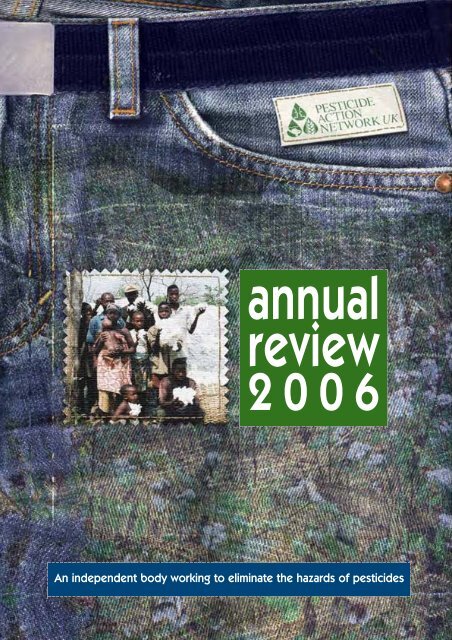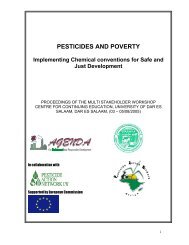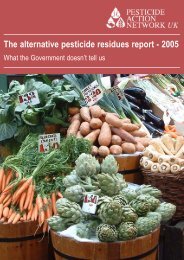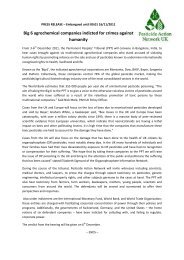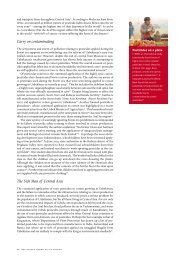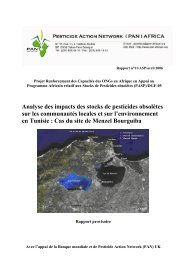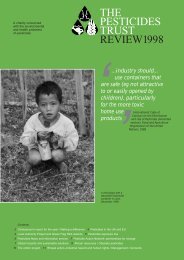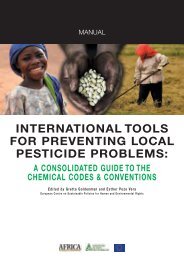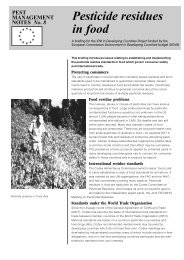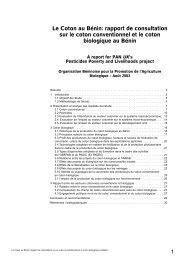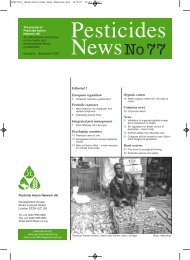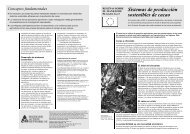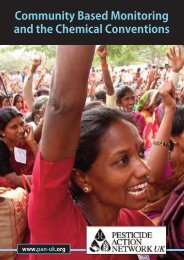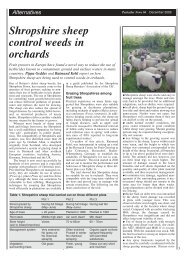Annual Review 2006 - Pesticide Action Network UK
Annual Review 2006 - Pesticide Action Network UK
Annual Review 2006 - Pesticide Action Network UK
Create successful ePaper yourself
Turn your PDF publications into a flip-book with our unique Google optimized e-Paper software.
annual<br />
review<br />
2 0 0 6<br />
An independent body working to eliminate the hazards of pesticides
From the Chair of PAN <strong>UK</strong><br />
In PAN <strong>UK</strong>’s 20th year of working to reduce and eliminate the hazards of pesticides, the growth in the demand for organic<br />
cotton, and increasing awareness by consumers of the provenance of the food they eat, clearly demonstrated progress in<br />
areas where PAN has sought to influence opinion. But while these showed achievements towards PAN’s vision of a world<br />
free of toxic pesticides, other events show there is still a long way to go. Confusion was caused by the World Health<br />
Organisation appearing to sanction the increased use of DDT for malaria control in Africa. In the <strong>UK</strong>, the government<br />
proved unwilling to accept the recommendations of the Royal Commission on Environmental Protection report on Crop<br />
Spraying and the Health of Residents and Bystanders. Both these events and many others show the need for PAN <strong>UK</strong>’s<br />
continuing work, on its own and as part of the PAN International network.<br />
Some of PAN <strong>UK</strong>’s achievements in <strong>2006</strong> are shown elsewhere in this review. As the Chair of the Board, I am pleased to<br />
report that in <strong>2006</strong>, the organisation remains on a firm financial footing, although gaining grants for our work in what is for<br />
some a very niche sector of operation remains a challenge, but one which, again and again, the small staff and volunteers,<br />
supported by the Board, have shown they can rise to.<br />
<strong>2006</strong> also marked the retirement of Barbara Dinham who had worked for PAN for 16 years , the last six as Director, and<br />
without whose commitment and dedication PAN would not be the organisation it is today. We are however delighted that<br />
Linda Craig, former General Secretary of Quaker Peace & Social Witness, joined PAN as Director in September.<br />
Martin Tyler<br />
Chair of the Board<br />
PAN <strong>UK</strong> objectives are to:<br />
• Eliminate the hazards of pesticides<br />
• Reduce dependence on pesticides<br />
• Promote ecologically and economically sound alternatives to chemical pest control<br />
PAN <strong>UK</strong> works at several levels:<br />
Local<br />
• providing information about how food and textiles are<br />
produced, to enable consumers to make choices<br />
about buying food free of residues and clothing and<br />
food which has been produced without the growers<br />
paying a price in money and their health.<br />
• increasing the market share of organic cotton in the <strong>UK</strong><br />
and other European countries<br />
• publishing advice about controlling pests in the home<br />
and garden without hazardous chemicals.<br />
International<br />
• working with other partner organisations to eliminate<br />
stocks of obsolete pesticides which impact on health<br />
and the environment across Africa, and working with<br />
local NGOs in Africa to prevent the build up of new<br />
stockpiles.<br />
• championing the small scale farmers, in Africa and<br />
elsewhere, as they balance the increasing demands of<br />
the global export trade on which their livelihoods depend with<br />
their abilities to produce food for domestic consumption<br />
National and European<br />
• working to challenge and change national and EU<br />
regulations on pesticides<br />
• providing information to those affected by pesticide<br />
exposure in the <strong>UK</strong>, with a campaign to increase the<br />
right to information about local pesticide use<br />
Global<br />
• monitoring the implementation of the conventions which<br />
regulate pesticides use, by providing training on<br />
monitoring local impacts and taking case studies about<br />
these impacts of pesticides to decision-makers in<br />
international institutions.<br />
• working with PAN regional centres globally to achieve a<br />
worldwide ban on the most toxic pesticides: endosulfan,<br />
paraquat and DDT.<br />
Outreach<br />
• An active programme of communication to raise awareness of pesticides issues supports and informs project work. This<br />
includes a widely-accessed website; publication of our quarterly journal, <strong>Pesticide</strong>s News; dissemination of peerreviewed<br />
research through Current Research Monitor and its related web-based research site www.pesticidelibrary.org;<br />
the supporters’ bulletin Greenfly; and a service to answer queries from the press and public. PAN <strong>UK</strong> also runs the<br />
` annual Rachel Carson Memorial Lecture.
Problems with pesticides<br />
<strong>Pesticide</strong>s are toxic chemicals used to kill or control pests (including insects, weeds, diseases) in agriculture, urban areas<br />
and for public health purposes. Their widespread introduction into the environment, often without adequate safeguards,<br />
create problems:<br />
Human poisonings and health risks<br />
Environmental hazards<br />
Loss of biodiversity<br />
Wildlife deaths<br />
Animal and livestock deaths<br />
Interference with natural pest control<br />
Resistance among pests<br />
Unwanted imports<br />
Obsolete and unusable stocks<br />
Residues in food<br />
Water pollution<br />
High input costs<br />
PAN <strong>UK</strong>’s targets for 2005-2010<br />
<strong>Pesticide</strong> <strong>Action</strong> <strong>Network</strong><strong>UK</strong><br />
Solving the problems<br />
1. <strong>Pesticide</strong> reduction in the <strong>UK</strong>: A reduction in pesticide<br />
use and exposure in the <strong>UK</strong> in agriculture, amenity and<br />
homes and gardens, through a pesticide reduction policy<br />
with measurable targets and monitoring systems.<br />
2. Global phase outs: The replacement of six of the<br />
most dangerous pesticides globally, particularly those<br />
recognised as extremely and highly hazardous by the<br />
World Health Organisation and those affecting the<br />
environment and biodiversity<br />
3. Cradle to grave impacts: Recognition of the adverse<br />
impacts of chemical pesticides throughout their life cycle<br />
including: pesticide poisonings; costs of regulation,<br />
disposal and monitoring impacts; and the hidden costs to<br />
health and the environment<br />
4. Corporate accountability: Better regulation of<br />
agrochemical corporations and the transparency of their<br />
activities in relation to pesticide production, sales, exports<br />
and use, with actions to curtail their influence.<br />
5. Obsolete stockpiles: A global clean-up of stocks of<br />
obsolete pesticides in an environmentally sound manner,<br />
backed with obligations and capacity to prevent future<br />
problems<br />
6. Centre of excellence: Establishment of a ‘centre of<br />
excellence’ on alternatives to increase the availability and<br />
access to safer pest management solutions<br />
7. Sustainable supply chains: The creation of a<br />
sustainable supply chain for organic cotton, linked to fair<br />
trade, and for similar fair and healthy supply chains of other<br />
commodities/food items that promote sustainable<br />
agriculture strategies and support rural livelihoods<br />
8. Sustainable agriculture: Significant acceptance at policy<br />
and practical levels of the value of organic, Intergrated Pest<br />
Management, and other agroecological strategies for<br />
farming, that are based on participatory approaches to<br />
build on farmer knowledge and promote biodiversity<br />
9. Supportive research: The adoption of policies by the<br />
<strong>UK</strong> and the EU that promote funding for public agricultural<br />
research with an emphasis on sustainable pest<br />
management<br />
10. A public voice for pesticide-free-futures: An enhanced<br />
awareness of pesticide problems, and effective channels<br />
for expression of concerns about residues in food, access<br />
to information, and adverse impacts on health and the<br />
environment, to influence changes in policy, regulation and<br />
business practices
Some of PAN <strong>UK</strong>’s achievements in<br />
Tickets for the Rachel Carson Memorial Lecture and associated exhibition sold out. In the lecture, Dr Camilla Toulmin of<br />
the International Institute for Environment and Development spoke about the importance of organic cotton to small scale<br />
farmers in West Africa, and a lively panel discussion was chaired by William Lana of Greenfibres. The exhibition included<br />
displays of organic cotton clothing from a variety of sources.<br />
Display of Organic Cotton Clothing at the Lecture<br />
Dr Camilla Toulmin presenting the Lecture<br />
‘We are building a new corporate website and in the Ecology section would like<br />
to make your publication “My Sustainable T-Shirt” available for download as a<br />
pdf file from our site. Your brochure does an excellent job of explaining it<br />
[what is implied by the term “organic” clothing] in a straightforward way.’<br />
Textile Company Manager<br />
Bringing 5 Senegalese vegetable smallholders on a farmer<br />
exchange visit to Europe to look at how European growers are<br />
coping with stricter pesticide requirements in a climate of<br />
decreasing farmgate prices. They visited conventional, organic and<br />
Integrated Pest Management (IPM) farms in <strong>UK</strong>, Netherlands and<br />
Germany, ranging from some of the most high technology and<br />
large-scale greenhouse tomato cultivation supplying major<br />
supermarkets to small-scale organic growers selling via local box<br />
schemes. Many useful lessons were exchanged on alternative<br />
marketing channels, the use of biological control in greenhouse<br />
production, and the need to consider consumer demands.<br />
Left: Senegalese farmer quizzes staff at organic farm, Germany<br />
‘<strong>Pesticide</strong>s News is really a good source for people to find each other and use<br />
the experiences for better practice in safe pest control’<br />
Hossein Heidari, Plant Protection Research Institute, IRAN.<br />
Establishing the Bhopal Medical Appeal as an independent charity: This was finalised in the early months of 2007,<br />
although the work for this was done throughout <strong>2006</strong>. The BMA has set a minimum target of transferring £70,000 a<br />
year towards the running costs of the Sambhavna Clinic, which provides medical care and support for the victims of the<br />
1984 Bhopal gas disaster. The target was achieved in <strong>2006</strong>.
<strong>2006</strong><br />
The launch of the new organic cotton website www.WearOrganic.org: a consumer-oriented and user-friendly website to<br />
raise the profile of organic cotton with the public. The centrepiece of the website is the Directory to Organic Cotton<br />
Retailers, which now contains 80 <strong>UK</strong> brands, 250 retail outlets and as<br />
many online or mail-order shops. The initial response from retailers has<br />
been excellent. From its launch, the Wear Organic section has proved<br />
by far the most popular section of the website accounting for just over<br />
30% of all traffic generated.<br />
‘PAN’s publications are fantastic. As a journalist I really appreciate such welldocumented<br />
and reliable info, which you can see has been thoroughly checked.’<br />
Angela Robson, BBC freelancer<br />
PAN <strong>UK</strong> provided significant input into the Royal Commission on Environmental Protection report on Crop Spraying and<br />
the Health of Residents and Bystanders, and like other campaigners, was dismayed when the government response<br />
rejected most of the recommendations, preferring a voluntary approach to more legislation. PAN continues both to<br />
monitor effectiveness of the voluntary approach, and to seek opportunities to influence the legislative process.<br />
A re-launch of the PAN <strong>UK</strong> website, including revised guidance on pesticide<br />
residues in food, based on PAN’s detailed analysis of government residue<br />
statistics. These pages provide practical information on how to avoid residues,<br />
including – top ten food for residues; worst and best fruit; worst and best<br />
vegetables; worst other food. Surveys show ongoing consumer concern about<br />
residues – PAN continues to provide the information consumers need.<br />
The new PAN <strong>UK</strong> website was launched in June <strong>2006</strong><br />
‘Many thanks once again for the monthly Gardening Tips, which I pass on to<br />
community gardening groups as well as dispose of a fair number in our cafe.<br />
Well done for churning them out every month!’<br />
London Borough Gardens Officer<br />
With PAN Africa and PAN Asia-Pacific, adapting the Community-based <strong>Pesticide</strong> <strong>Action</strong> Monitoring training materials<br />
which have been successful in Asia to an African context. Communities which have been trained will be able to provide<br />
scientifically rigorous evidence of how pesticides are affecting health and environment in their communities, to influence<br />
international pesticide regulation. The first training events took place in Tanzania and Senegal in summer <strong>2006</strong>. 52<br />
participants were drawn from Mali, Morocco, Tunisia, Benin, Togo, Cameroon, Senegal, Guinea Bissau, Niger, Burkina<br />
Faso, Tanzania and Mauritania to ensure that a maximum dissemination of this training.<br />
NGO and government extension staff in practical training on ecotoxicological monitoring, Ethiopia
Statement of Financial Activities<br />
(incorporating income and expenditure account)<br />
For the year ended 31 December <strong>2006</strong><br />
INCOMING RESOURCES<br />
Restricted Unrestricted Total Total<br />
Funds <strong>2006</strong> £ Funds <strong>2006</strong> £ Funds <strong>2006</strong> £ Funds 2005 £<br />
Incoming resources from generated funds<br />
Voluntary income and core funding - 20,000 20,000 12,945<br />
Activities to generate funds - 83,900 83,900 61,062<br />
Investment income - 8,666 8,666 12,985<br />
Incoming resources from charitable activity 1,407,201 11,005 1,418,206 1,158,058<br />
Other incoming resources - 21,616 21,616 -<br />
TOTAL INCOMING RESOURCES 1,407,201 145,187 1,552,388 1,245,050<br />
RESOURCES EXPENDED<br />
Costs of generating funds:<br />
Fundraising and promotion costs - 12,995 12,995 22,878<br />
Charitable expenditure:<br />
Costs of activities in furtherance of the<br />
charity's objects 1,474,462 14,868 1,489,330 1,195,394<br />
Governance costs - 8,588 8,588 14,202<br />
TOTAL RESOURCES EXPENDED 1,474,462 36,451 1,510,913 1,232,474<br />
Net income / (expenses) (67,261) 108,736 41,475 12,576<br />
TOTAL FUNDS AT 1 JANUARY <strong>2006</strong> 258,515 66,411 324,926 312,350<br />
TOTAL FUNDS AT 31 DECEMBER <strong>2006</strong> £ 191,254 £ 175,147 £ 366,401 £ 324,926<br />
Full annual accounts for <strong>2006</strong> available at www.pan-uk.org<br />
PAN <strong>UK</strong> is grateful for all the generous support we received, financially and in kind, in <strong>2006</strong>. Major donors are listed<br />
below, and we also received many donations from individuals. It is not possible to list all these, but we thank all those<br />
who have sent donations - these are vital to PAN <strong>UK</strong>’s operation.<br />
Major donors in <strong>2006</strong><br />
1970 Trust, Chapman Charitable Trust, City Bridge Trust,<br />
Commission of the European Communities, Cuthbert Horn<br />
Charitable Trust, Environment Agency, Esmee Fairburn<br />
Foundation, Food and Agriculture Organisation of the United<br />
Nations, Hivos (Biodiversity Fund of the Dutch Government), JA<br />
Clark, JJ Charitable Trust, Oxfam-NOVIB, Sheepdrove Trust, The<br />
Cooperative Bank, The Joseph Rowntree Charitable Trust, The<br />
Rufford Maurice Laing Foundation, The Sigrid Rausing Trust,<br />
World Bank Development Grant Fund.<br />
Left: Farmer in Tanzania: unsafe spraying practices
<strong>Pesticide</strong> <strong>Action</strong> <strong>Network</strong> <strong>UK</strong> works to eliminate the dangers of toxic pesticides, our exposure to them, and their presence<br />
in the environment where we live and work. Nationally and globally, PAN promotes safer alternatives, the production of<br />
healthy food and sustainable farming.<br />
Staff<br />
Linda Craig, Director<br />
Oscar Martinez, Finance Manager<br />
Dr. Stephanie Williamson, International Project Officer, Food &<br />
Fairness<br />
Damien Sanfilippo, Cotton Project Officer<br />
Eloise Touni, Project Officer, African Stockpiles and <strong>Pesticide</strong>s<br />
and Poverty (maternity leave to early 2008)<br />
Dr. Sheila Willis, Project Officer, African Stockpiles and<br />
<strong>Pesticide</strong>s and Poverty<br />
Dr. Roslyn McKendry, Editor of <strong>Pesticide</strong>s News, National<br />
Project Officer<br />
Nick Mole, <strong>UK</strong> and European Programme Coordinator<br />
Rebecca Richings, Information and Outreach Manager<br />
Diane Gangadeen, Assistant Accountant<br />
Ed Payne, Senior Administrator<br />
Elliott Cannell, PAN Europe Coordinator<br />
Kate Bootle, Executive Secretary, Bhopal Medical Appeal<br />
Barbara Dinham, retired October <strong>2006</strong><br />
Alistair Friend, left May <strong>2006</strong><br />
Alison Craig, left July <strong>2006</strong><br />
Clare Butler Ellis, left December <strong>2006</strong><br />
Board of Directors<br />
Martin Tyler (Chair), Head of Finance, Fairtrade Foundation<br />
David Baldock, Director, Institute for European Environmental<br />
Policy<br />
Peter Beaumont, Osteopath<br />
Eileen Maybin, Media Advisor, Fairtrade Foundation<br />
Jane Shepherd, Founder, Organics for Kids<br />
Laura Potts, Reader in Public Health and the Environment, York<br />
St John University<br />
Mike Ward, Transport and General Workers Union, lay<br />
representative<br />
Christopher Stopes, EcoS Consultancy<br />
Anthony Youdeowei, Adviser to the Food and Agriculture<br />
Organisation of the UN, Accra, Ghana<br />
Sandra Bell, Friends of the Earth (resigned September <strong>2006</strong>)<br />
Volunteers<br />
We have continued to benefit from the hard work of a range of<br />
volunteers, some for short periods, others over a longer period<br />
of time. In <strong>2006</strong>, these were:<br />
Rico Coelho, Judy Daniels, Hazel Drummond, Brian Green, Ava<br />
Greenwell, Gaelle Hossie, Sarah Johnston, Tomo Kojo-<br />
Robertson, Lidia Labbaci, Alisa Levina, Jonathan Marriott,<br />
Sharna Richings, Maddy Rolinson, Sanja Treskic, Reinalt<br />
Vaughan-Williams, Manga Waggott.<br />
Publications<br />
<strong>Pesticide</strong>s News<br />
PAN <strong>UK</strong>’s flagship quarterly journal provided in-depth<br />
research, news and information to subscribers –<br />
practitioners, policy-makers, NGOs and other in over 100<br />
countries. In <strong>2006</strong>, readers learnt, for example, about the<br />
hazards of pesticides in West African Cotton growing, PAN<br />
North America’s drift catcher project, the impact of farmer<br />
training in Africa, food residues campaigns in Austria and<br />
the Netherlands, and the progress of the African Stockpiles<br />
Programme. PN critiqued the <strong>UK</strong> national pesticide strategy<br />
and EU directives on the use of pesticides. All this<br />
alongside smaller news items and book reviews.<br />
Greenfly<br />
In Autumn <strong>2006</strong>, Greenfly, our newsletter for supporters<br />
was an allotment special. It also included a handy wallet<br />
sized cut-out-and-keep guide to the fruits, vegetable and<br />
other foods shown to have the highest pesticide residues.<br />
Gardening Tips<br />
Produced monthly, and downloaded by or sent to over<br />
1,000 gardeners, allotment holders and allotment<br />
organisations, Gardening Tips included a monthly round up<br />
of tasks, and updates on chemical free ways of dealing with<br />
pests and diseases, such as downy mildew and carrot root<br />
fly.<br />
Other publications produced in <strong>2006</strong><br />
• Your Daily Poison: The Second <strong>UK</strong><br />
<strong>Pesticide</strong> Exposure Report<br />
• The Alternative <strong>Pesticide</strong>s Residues<br />
report – what the Government<br />
doesn’t tell us<br />
• My Sustainable T shirt – a guide to<br />
Organic, Fairtrade, and other Eco<br />
Standards and Labels for Cotton<br />
Textiles
Company Registered Number<br />
02036915<br />
Charity Registered Number<br />
0327215<br />
Registered Office<br />
Development House, 56-64 Leonard Street, London EC2A 4LT<br />
+44 207 065 0905<br />
Visit these key PAN websites for pesticide resources<br />
www.pesticidelibrary.org<br />
PAN <strong>UK</strong>’s web-based library of scientific and other research papers on pesticide<br />
concerns<br />
www.pesticidedisposal.org<br />
PAN <strong>UK</strong>’s online database of pesticide disposal facilities<br />
www.pesticideinformation.org<br />
PAN North America’s comprehensive and easily searchable database on all<br />
pesticide active ingredients<br />
www.oisat.org<br />
PAN Germany’s new database on sustainable alternatives to chemical pesticides in<br />
14 important crops important for developing countries


